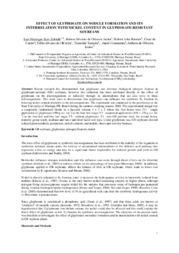Effect of glyphosate on nodule formation and its interrelation with nickel content in glyphosate-resistant soybeans.
Effect of glyphosate on nodule formation and its interrelation with nickel content in glyphosate-resistant soybeans.
Summary: Recent research has demonstrated that glyphosate can decrease biological nitrogen fixation in glyphosate-resistant (GR) soybeans, however this reduction has been attributed directly to the effect of glyphosate on the microorganisms or indirectly through its intermediates that are also toxic to these microorganisms. This work aims to demonstrate that glyphosate can influence the symbiotic N2 fixation by lowering nickel content available to the microorganisms. The experiment was conducted in the greenhouse at the State University of Maringá, PR, Brazil during the summer cropping season, 2008. The experimental design was a completely randomized blocks in a factorial scheme 4 x 3 x 2 where the first factor was: (T1 - single application of glyphosate (900 g a.e. ha-1) at the four-leaf stage; T2 - sequential application (450 + 450 g a.e. ha-1) at the four-leaf and five-leaf stage; T3 - without glyphosate; T4 - non-GR parental line]; the second factor, maturity group (early, medium and late;) and third factor soil type. Under glyphosate use, GR soybeans showed reduced photosynthetic parameters, nickel contents, and nodule, shoot and root dry biomass.
Publication year: 2009
Types of publication: Paper in annals and proceedings
Unit: Embrapa Soybean
Observation
Some of Embrapa's publications are published as ePub files. To read them, use or download one of the following free software options to your computer or mobile device. Android: Google Play Books; IOS: iBooks; Windows and Linux: Calibre.
Access other publications
Access the Agricultural Research Database (BDPA) to consult Embrapa's full library collection and records.
Visit Embrapa Bookstore to purchase books and other publications sold by Embrapa.

